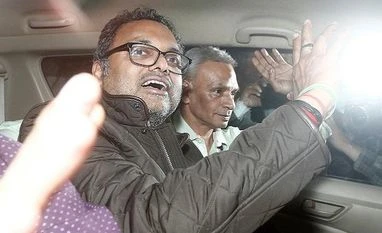The adjudicating authority of the Prevention of Money Laundering Act (PMLA) on Tuesday confirmed attachment of Karti Chidambaram's assets worth Rs 11.6 million his Advantage Strategic Consulting Pvt Ltd in connection with the Aircel-Maxis case.
The Enforcement Directorate had attached movable assets in the form of Fixed Deposits and balance in saving bank account amounting to Rs 11.6 million held by Karti Chidambaram and Advantage Strategic Consulting Pvt Ltd. (ASCPL) under PMLA on September 23 last year in the said case.
The role of the former finance minister P Chidambaram in the Aircel-Maxis is also being investigated as he was the one who had allegedly bypassed the Cabinet Committee on Economic Affairs (CCEA) in granting the Foreign Direct Investment (FDI) approval to the Aircel-Maxis to the tune of Rs 35 billion.
Chidambaram was authorised to approve FDI only up to Rs 6 billion, the amount above that had to be cleared by the CCEA.
"This attachment was done as the above amount is involved in money laundering concerning with the FIPB approval given to Aircel Limited on March 20, 2006, by the then Finance Minister for which he was not competent to approve," the Enforcement Directorate has said in a statement.
The investigation also revealed that a payment of Rs 2.6 million by Aircel Televentures Limited (ATVL) (the seller of equity shares in this deal) was done to Advantage Strategic Consulting Pvt Ltd. (ASCPL) within a few days of the Foreign Investment Promotion Board (FIPB) approval.
"Another sum of Rs 9 million approximately) was received by Chess Management Services Pvt. Ltd. (a company promoted by Karti P Chidambaram) and Sh. A. Palaniappan (nephew of P. Chidambaram) from Maxis Group Company allegedly for legal compliance software. These payments were no genuine and bonafide in nature," the statement of the ED further read.
More From This Section
As per the investigative agency, Karti Chidambaram controlled ASCPL with the help of S. Bhaskararaman, who was described as his CFO / CA and looks after his financial matters.
This comes at a time when the Supreme Court has directed the Enforcement Directorate to complete its investigation in the case within six months.
)